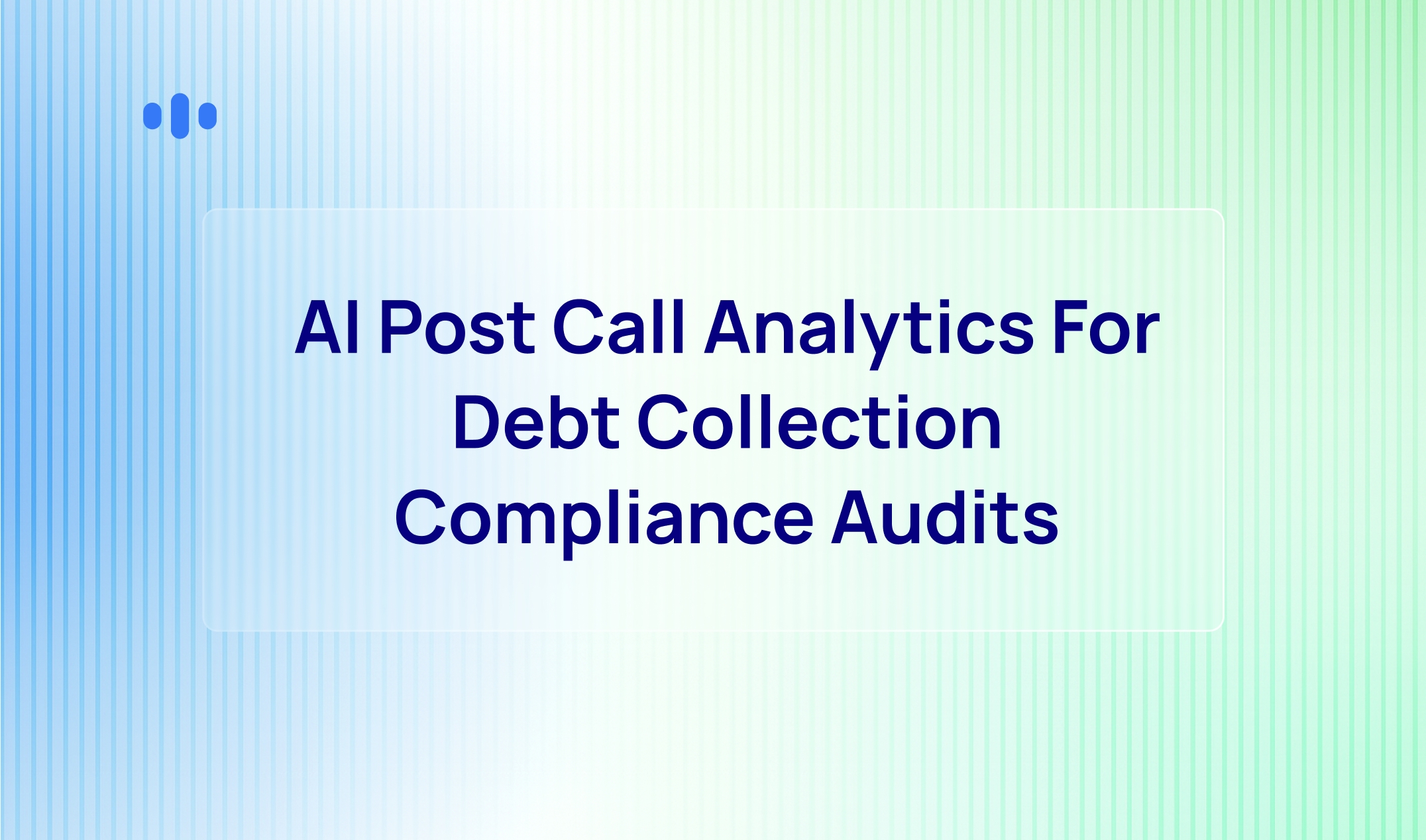Why 68 % of Collection Agencies Will Adopt Post-Call AI Analytics for Compliance Audits by 2026


The debt collection industry stands at a critical inflection point. With regulatory scrutiny intensifying and consumer protection laws becoming more stringent, collection agencies face mounting pressure to maintain compliance while maximizing recovery rates. According to recent Gartner research from Q1 2025, 68% of collection agencies plan to implement AI-powered quality assurance systems by 2026 specifically to reduce Fair Debt Collection Practices Act (FDCPA) disputes. (Retell AI)
This shift toward post-call AI analytics represents more than just a technological upgrade—it's a fundamental transformation in how agencies approach compliance, quality control, and operational efficiency. Traditional quality assurance methods, which typically sample less than 5% of calls, are proving inadequate in today's regulatory environment. (Observe.AI) The stakes have never been higher, with FDCPA violations carrying penalties of up to $1,000 per incident and potential class-action lawsuits that can devastate agencies.
The convergence of advanced AI capabilities, regulatory requirements, and competitive pressures is driving this rapid adoption. Modern AI-powered systems can analyze 100% of calls in real-time, providing immediate feedback on compliance issues, agent performance, and recovery optimization opportunities. (Retell AI) This comprehensive approach not only reduces legal risk but also enables agencies to identify and replicate successful collection strategies across their entire operation.
Most collection agencies still rely on manual quality assurance processes that sample a tiny fraction of their total call volume. Industry standards typically involve reviewing 3-5% of calls, leaving 95% of interactions unmonitored and potentially non-compliant. (MaestroQA) This sampling approach creates significant blind spots where compliance violations can occur undetected, exposing agencies to regulatory action and consumer complaints.
The manual review process is not only limited in scope but also inconsistent in application. Human reviewers may interpret compliance requirements differently, leading to subjective scoring and missed violations. Additionally, the time lag between call completion and review means that non-compliant behaviors can persist for weeks or months before detection. (Provana)
The Consumer Financial Protection Bureau (CFPB) has significantly increased its enforcement activities in recent years, with debt collection ranking among the top complaint categories. Agencies must maintain detailed records of all consumer interactions, including call recordings, transcripts, and compliance documentation. (Retell AI) The regulatory framework requires agencies to demonstrate proactive compliance monitoring rather than reactive problem-solving.
FDCPA violations can result from seemingly minor infractions—incorrect disclosure timing, inappropriate language, or failure to provide required information. These violations often stem from agent training gaps or script deviations that traditional QA methods fail to catch consistently. (Eve Calls) The financial and reputational costs of non-compliance continue to escalate, making comprehensive monitoring essential for sustainable operations.
Beyond direct regulatory penalties, FDCPA violations can trigger costly litigation and damage agency reputations. Consumer attorneys increasingly use recorded calls as evidence in debt collection lawsuits, making comprehensive call monitoring a defensive necessity. (Dispute Armor) Agencies that cannot demonstrate systematic compliance monitoring face higher settlement costs and reduced credibility in legal proceedings.
The indirect costs of non-compliance include increased insurance premiums, difficulty obtaining financing, and challenges in client acquisition. Collection agencies with strong compliance records command premium rates and attract higher-quality debt portfolios. (Bridgeforce Data Solutions)
Post-call AI analytics systems represent a quantum leap in quality assurance capabilities. These platforms can analyze 100% of calls within seconds of completion, identifying compliance issues, script deviations, and performance metrics with unprecedented accuracy. (Retell AI) Unlike traditional sampling methods, AI-powered systems provide comprehensive coverage that eliminates blind spots and ensures consistent compliance monitoring.
The technology leverages natural language processing (NLP) and machine learning algorithms to understand conversation context, identify required disclosures, and flag potential violations in real-time. (Nobel Biz) This immediate feedback enables supervisors to address compliance issues before they become systemic problems, significantly reducing regulatory risk.
Modern post-call analytics platforms offer sophisticated scoring mechanisms that evaluate multiple dimensions of call quality simultaneously. These systems can assess tone analysis, settlement success rates, script adherence, and regulatory compliance within a unified dashboard. (Retell AI) The multi-dimensional analysis provides managers with actionable insights that drive both compliance and performance improvements.
Sentiment analysis capabilities help agencies understand consumer emotional responses and adjust their approach accordingly. This emotional intelligence component is particularly valuable in debt collection, where maintaining professional relationships while pursuing payment requires nuanced communication skills. (Retell AI)
Compliance requires meticulous documentation, and AI-powered systems excel at creating comprehensive audit trails. Every call generates detailed reports that include compliance scores, identified issues, and recommended actions. (Retell AI) These automated reports satisfy regulatory record-keeping requirements while providing valuable data for performance optimization.
SOC 2-aligned systems ensure that all recordings and transcripts are stored with enterprise-grade security, including 256-bit encryption and access controls. This security framework meets CFPB record-keeping requirements while protecting sensitive consumer information. (Retell AI)
Retell AI's post-call analytics dashboard provides collection agencies with unprecedented visibility into their operations. The platform scores multiple performance dimensions including tone analysis, settlement success rates, and script adherence, delivering actionable insights within 30 seconds of call completion. (Retell AI) This rapid analysis enables immediate coaching opportunities and prevents compliance issues from escalating.
The dashboard's intuitive interface presents complex analytics in easily digestible formats, allowing managers to quickly identify trends, outliers, and improvement opportunities. Color-coded alerts highlight urgent compliance issues, while detailed drill-down capabilities provide context for performance coaching. (Retell AI)
One of Retell AI's most powerful features is its ability to flag non-compliance issues in under 30 seconds. The system continuously monitors conversations for FDCPA violations, including improper disclosures, threatening language, or failure to provide required information. (Retell AI) This immediate feedback allows supervisors to intervene quickly, potentially preventing violations from occurring in subsequent calls.
The compliance flagging system uses sophisticated natural language processing to understand context and intent, reducing false positives while maintaining high sensitivity to actual violations. This balanced approach ensures that agents receive accurate feedback without being overwhelmed by unnecessary alerts. (Retell AI)
Retell AI's platform maintains SOC 2 compliance with robust security measures including 256-bit encryption for all stored recordings and transcripts. This security framework satisfies CFPB record-keeping requirements while ensuring that sensitive consumer data remains protected. (Retell AI) The platform's audit trail capabilities provide comprehensive documentation for regulatory examinations and legal proceedings.
The system's role-based access controls ensure that only authorized personnel can access sensitive call data, while detailed logging tracks all user activities for security monitoring. These enterprise-grade security features give collection agencies confidence that their compliance monitoring system meets the highest industry standards. (Retell AI)
Traditional quality assurance systems that sample less than 5% of calls create significant operational blind spots. This limited coverage means that the vast majority of agent-consumer interactions remain unmonitored, potentially allowing compliance violations and performance issues to persist undetected. (Observe.AI) The statistical limitations of sampling become particularly problematic in debt collection, where individual violations can result in significant legal and financial consequences.
Sampling-based approaches also fail to capture the full spectrum of agent performance and consumer interactions. High-performing agents may have their few sampled calls reviewed, while struggling agents might avoid detection if their problematic calls fall outside the sample. This inconsistent coverage undermines the effectiveness of coaching and compliance programs. (MaestroQA)
Retell AI's ability to analyze 100% of calls in real-time provides collection agencies with complete operational visibility. This comprehensive coverage ensures that every consumer interaction is monitored for compliance and performance, eliminating the blind spots that plague traditional QA systems. (Retell AI) The complete coverage approach enables agencies to identify patterns and trends that would be invisible with sampling-based methods.
Full call analysis also enables more accurate performance measurement and coaching. Managers can base their assessments on complete performance data rather than limited samples, leading to more effective agent development and improved outcomes. (Retell AI) This comprehensive approach to quality assurance transforms how agencies manage their operations and develop their workforce.
One of the most significant advantages of comprehensive call analysis is the ability to identify and address script deviations immediately. When the system detects that agents are consistently deviating from approved scripts or compliance requirements, it can trigger immediate retraining protocols. (Retell AI) This rapid response capability prevents minor issues from becoming systemic problems that could expose the agency to regulatory action.
The immediate feedback loop also enables continuous script optimization based on real performance data. Agencies can identify which script variations produce the best results and update their training materials accordingly. (Retell AI) This data-driven approach to script development ensures that agents are equipped with the most effective tools for successful and compliant debt collection.
Retell AI's comprehensive call analysis has demonstrated significant impact on collection performance, with agencies reporting 19% higher recovery rates on flagged accounts. (Retell AI) This improvement stems from the system's ability to identify successful collection strategies and replicate them across the entire operation. By analyzing every interaction, the platform can determine which approaches work best for different consumer segments and debt types.
The performance improvement is particularly notable because it occurs while maintaining strict compliance standards. Traditional approaches often view compliance and performance as competing priorities, but AI-powered analytics demonstrates that proper compliance monitoring actually enhances collection effectiveness. (Retell AI) Agents who follow compliant scripts and procedures tend to achieve better outcomes because they build trust and rapport with consumers.
Advanced AI systems can analyze historical call data to predict which accounts are most likely to result in successful collections. This predictive capability enables agencies to prioritize their efforts on accounts with the highest probability of payment, maximizing resource utilization and recovery rates. (Nobel Biz) The predictive models consider factors such as consumer response patterns, payment history, and communication preferences to optimize collection strategies.
The ability to identify high-potential accounts early in the collection cycle allows agencies to allocate their best agents to the most promising opportunities. This strategic resource allocation contributes significantly to the observed 19% improvement in recovery rates. (Eve Calls) The predictive analytics also help agencies avoid wasting resources on accounts that are unlikely to pay, improving overall operational efficiency.
AI-powered post-call analytics systems continuously learn from every interaction, refining their analysis capabilities and recommendations over time. This machine learning approach means that the system becomes more accurate and valuable as it processes more data. (Retell AI) The continuous improvement cycle ensures that agencies benefit from increasingly sophisticated insights and recommendations.
The learning capabilities extend to understanding consumer behavior patterns and preferences, enabling more personalized collection approaches. Agencies can tailor their communication strategies based on individual consumer profiles, improving both compliance and collection success rates. (Retell AI) This personalization capability represents a significant advancement over traditional one-size-fits-all collection approaches.
Successful implementation of post-call AI analytics requires careful consideration of existing technology infrastructure and integration requirements. Agencies must ensure that their phone systems, recording equipment, and data storage capabilities can support real-time AI analysis. (TechCrunch) Modern AI platforms like Retell AI are designed to integrate seamlessly with existing contact center infrastructure, minimizing disruption during implementation.
The integration process typically involves connecting the AI platform to existing phone systems through APIs or direct integrations. Cloud-based solutions offer particular advantages in terms of scalability and maintenance, allowing agencies to focus on their core collection activities rather than technology management. (Retell AI) Proper integration ensures that the AI system can access all necessary call data while maintaining security and compliance requirements.
Implementing AI-powered quality assurance represents a significant change for collection agencies, requiring comprehensive change management and training programs. Agents and supervisors must understand how the new system works and how it will impact their daily activities. (Provana) Successful implementations typically involve extensive training on the new dashboard interfaces, alert systems, and performance metrics.
The change management process should emphasize the benefits of AI-powered QA for both the agency and individual agents. Rather than viewing the system as punitive monitoring, agents should understand how it provides immediate feedback and coaching opportunities that can improve their performance and career development. (Retell AI) This positive framing is essential for achieving buy-in and maximizing the system's effectiveness.
Implementing AI-powered call analysis requires careful attention to legal and regulatory requirements. Agencies must ensure that their recording and analysis practices comply with state and federal laws regarding call recording and consumer privacy. (Bridgeforce Data Solutions) The AI system must also be configured to recognize and flag potential legal issues in real-time, providing an additional layer of protection against compliance violations.
Data retention and security policies must be updated to reflect the increased volume and sensitivity of data being collected and analyzed. SOC 2 compliance and encryption requirements become particularly important when implementing comprehensive call monitoring systems. (Retell AI) Agencies should work closely with legal counsel to ensure that their AI implementation meets all applicable regulatory requirements.
The contact center AI market is experiencing rapid growth, with projections indicating expansion from $2.4 billion in 2022 to nearly $3 billion by 2028. (TechCrunch) This growth is driven by increasing regulatory pressure, cost reduction needs, and the proven effectiveness of AI-powered solutions in improving both compliance and performance outcomes.
The debt collection industry is particularly well-positioned to benefit from AI adoption, given the high-stakes nature of compliance requirements and the significant financial impact of performance improvements. Early adopters are already seeing competitive advantages in terms of reduced legal risk, improved recovery rates, and enhanced operational efficiency. (Retell AI) The 68% adoption rate projected by Gartner reflects the industry's recognition of AI's transformative potential.
Future developments in post-call AI analytics will likely include even more sophisticated natural language processing capabilities, improved predictive analytics, and enhanced integration with other business systems. Real-time coaching capabilities that provide agents with immediate feedback during calls represent a particularly promising development. (Nobel Biz) These advanced features will further improve both compliance and performance outcomes.
The integration of AI voice agents with post-call analytics represents another significant trend. Agencies are beginning to use AI agents for initial consumer contact, with human agents handling more complex interactions. (Retell AI) This hybrid approach combines the efficiency of AI with the nuanced judgment of human agents, while maintaining comprehensive monitoring and compliance capabilities.
Regulatory agencies are also adapting to the increased use of AI in debt collection, with new guidance and requirements likely to emerge. The CFPB and other regulatory bodies are developing frameworks for AI governance that will impact how collection agencies implement and operate their AI systems. (Dispute Armor) Agencies that adopt AI-powered compliance monitoring early will be better positioned to adapt to evolving regulatory requirements.
The trend toward more stringent compliance monitoring and documentation requirements makes AI-powered systems increasingly essential for sustainable operations. Agencies that continue to rely on manual, sampling-based QA methods will find it increasingly difficult to meet regulatory expectations and compete effectively. (Retell AI)
The convergence of regulatory pressure, technological capability, and competitive dynamics makes AI-powered post-call analytics an imperative rather than an option for collection agencies. The Gartner projection that 68% of agencies will adopt these systems by 2026 reflects the industry's recognition that traditional QA methods are no longer adequate for today's compliance and performance requirements. (Retell AI)
Agencies that embrace comprehensive AI-powered monitoring will gain significant advantages in terms of reduced legal risk, improved recovery rates, and enhanced operational efficiency. The 19% improvement in recovery rates demonstrated by Retell AI's platform, combined with the comprehensive compliance monitoring capabilities, provides a compelling business case for adoption. (Retell AI) The ability to analyze 100% of calls in real-time, rather than sampling 5% or less, represents a fundamental improvement in quality assurance capabilities.
The transformation of debt collection through AI-powered analytics is not just about technology—it's about creating more professional, compliant, and effective collection operations. Agencies that invest in these capabilities now will be better positioned to thrive in an increasingly regulated and competitive environment. (Retell AI) The future of debt collection lies in the intelligent application of AI to enhance both compliance and performance, making post-call analytics an essential component of modern collection operations.
As the industry continues to evolve, the agencies that succeed will be those that leverage AI not just as a monitoring tool, but as a comprehensive platform for operational excellence. The combination of real-time compliance monitoring, performance optimization, and predictive analytics creates opportunities for agencies to transform their operations and achieve sustainable competitive advantages. (Retell AI) The question is not whether to adopt AI-powered post-call analytics, but how quickly agencies can implement these transformative capabilities.
Post-call AI analytics is technology that automatically analyzes 100% of collection calls after they occur to identify compliance issues, quality metrics, and performance indicators. It helps agencies reduce FDCPA disputes, maintain audit trails, and improve recovery rates by providing real-time insights into agent performance and regulatory adherence.
According to Gartner research from Q1 2025, agencies are facing mounting regulatory pressure and need to maintain compliance while maximizing recovery rates. AI analytics provides comprehensive monitoring, immediate compliance flagging, and SOC 2-compliant audit trails that traditional quality assurance methods cannot match at scale.
AI-powered collection systems can deliver up to 19% higher recovery rates compared to traditional methods. This improvement comes from real-time compliance monitoring, personalized customer interactions, and the ability to analyze 100% of calls rather than just a small sample.
AI collection systems must adhere to strict regulatory guidelines including the Fair Debt Collection Practices Act (FDCPA), Telephone Consumer Protection Act (TCPA), Consumer Financial Protection Bureau (CFPB) requirements, and GDPR for international operations. These systems ensure debt collection efforts remain ethical, compliant, and non-intrusive.
Retell AI's system provides comprehensive monitoring that analyzes 100% of calls in real-time, delivering immediate compliance flagging and maintaining SOC 2-compliant audit trails. The platform automates essential portions of company scripts and industry disclosures to ensure adherence to FDCPA and other regulatory requirements while providing personalized collection experiences.
AI voice agents can handle high volumes of debt collection calls while reducing operational costs and increasing collection rates. They can proactively remind customers about past-due payments, offer flexible repayment options, process transactions in real-time, and provide seamless transfer to human agents with full context when necessary.

Start building smarter conversations today.

